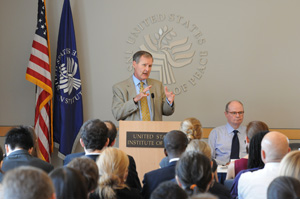Monopoly of Force
In the aftermath of war, two processes are vital to successfully manage the transition to stability: disarmament, demobilization and reintegration (DDR) and security sector reform (SSR). On September 12, 2011, the U.S. Institute of Peace hosted a panel of distinguished experts with combined experience implementing DDR and SSR in Afghanistan, Iraq, Liberia, the Balkans, Somalia and Haiti.

In the aftermath of war, two processes are vital to successfully manage the transition to stability: disarmament, demobilization and reintegration (DDR) and security sector reform (SSR). DDR involves disbanding armed groups that challenge the state's monopoly of force. SSR involves reforming the state's security forces so they are accountable to the people they are sworn to protect. Historically, DDR and SSR have been viewed as linear and tackled in that order. In fact, the demobilization of former fighters and the creation of new security forces are complex, interdependent processes.
On September 12, 2011, the U.S. Institute of Peace hosted a panel of distinguished experts with combined experience implementing DDR and SSR in Afghanistan, Iraq, Liberia, the Balkans, Somalia and Haiti. The panel discussed lessons learned and recommendations for future peacebuilding operations. The event introduced the National Defense University Press's new book, Monopoly of Force: The Nexus between DDR and SSR. This compilation of essays by experts and practitioners grew out of a March 2010 conference organized by USIP and the Center for Complex Operations at NDU.
Speakers
- Ambassador James Dobbins (ret.), Panelist
RAND Corporation - Lt. Gen. David Barno (ret.), Panelist
Center for New American Security - Ambassador John Blaney (ret.), Panelist
Deloitte Consulting LLP - Melanne Civic, Esq., Panelist
Center for Complex Operations, National Defense University
- Robert Perito, Moderator
U.S. Institute of Peace
Explore Further
- Monopoly of Force
Event Video | September 12, 2011 - From Militants to Policemen: Three Lessons from U.S. Experience with DDR and SSR
Peace Brief | November 2011 - USIP's Security Sector Governance Center



